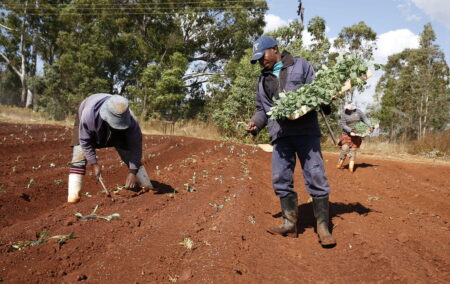Towards the beginning of 2018, I recall listening to a radio talk show. The topic, as has been the case so often since then, was the proposed policy of Expropriation without Compensation (EWC). Put forward by the African National Congress and their sometime allies in the Economic Freedom Fighters, EWC was to be the definitive remedy for South Africa’s ‘land question’.
The callers were passionate, one way or another. One young woman in particular enthused about the possibilities, and was eager to get started. She dreamed of owning and working her own piece of the country. ‘Where can I go to get my land?’ she asked.
It’s a question that may be on the minds of a lot of South Africans. The expectation that decisive action is imminent has been cultivated by the ruling party and the government it leads. So has the notion that EWC will be transformative, not only in rectifying historical wrongs, but in offering immense opportunities. It is, President Ramaphosa claimed (around the time the talk-show caller was making her enquiries), the path that will transform the country into a Garden of Eden.
Recently, against the backdrop of the drought-hit Northern Cape, the president reiterated that EWC was on the way: ‘We said our land reform process, which includes a decision taken at the 54th conference of expropriating land, is what is going to happen – and it will also happen here in the Northern Cape.’
Perhaps he is right. After all, in March last year, the ANC in the province put out a list of 30 farms it had identified for compensation-free expropriation. The list was merely an initial stage and more properties would be added in due course. That the list largely comprised productive farms came as a shock for those who had believed that EWC would be confined to abandoned properties, bankrupt farms and derelict buildings. No, EWC seems set to go after value.
The proposed constitutional amendment, meanwhile, makes it clear – again contrary to the expectations of some that EWC might be limited to land – that ‘improvements’ may also be taken with no compensation.
What is not clear is whether anyone will be able – as the caller put it – to ‘get’ land.
Largely unnoticed – possible intentionally so – was the publication of the draft National Policy for Beneficiary Selection and Land Allocation, in the Government Gazette on 3 January. It is an attempt to deal with one of the most enduring problems besetting land reform, that is, who should receive land and on what terms.
The key takeaway here is that there is no mention of ownership; the document envisages conferring no title on beneficiaries of land redistribution endeavours. (Redistribution is that part of the land reform drive that aims to make available land on the basis of need, rather than to redress a specific instance of deprivation. As such, it is arguably the most important and potentially far-reaching element. It is this, presumably, that the caller would hope to benefit from.)
In line with existing policy – outlined in the State Land Lease and Disposal Policy – ownership of properties passed on to beneficiaries will remain with the state.
This in turn provides a succinct answer to the caller’s query: she will not be able to ‘get’ land, at least not in the sense she had intended. She may successfully ‘access’ land, but the official position is that it will not belong to her. (Current policy makes provision for a possible sale to those who have managed to produce on a substantive commercial scale after a period of 50 years, and it is not clear whether the new policy will alter this.)
This position – state ownership with tenancy – was explicitly confirmed, as policy, by government in its court papers in the recent case of David Rakgase, a successful black farmer who turned to the courts after the government reneged on a deal to sell him the land he had been working for close on thirty years. Defending its decision to refuse him ownership, government reiterated in its papers that ‘black farming households and communities may obtain 30-year leases, renewable for a further 20 years, before the state will consider transferring ownership to them’.
This is disappointing news to many South Africans. For there is plenty of evidence that the desire to own property – as opposed to a conditional ‘access’ – is a deep one for South Africans of all hues and persuasions. No one less than President Ramaphosa has acknowledged this. In August last year, he commented: ‘I think we should not rob our people from deep yearning and quest to want to own pieces of land. … Some of them are coming forward to say: “We want to own‚ we want to have a sense of ownership of the land that you’re distributing to us.” So my own view is that rather than frustrate this deep yearning that our people have about owning the land‚ we should not frustrate them by saying you cannot own this land‚ it’s now going to be owned by the state. We should allow our people to own the land.’
Yet it is the position of his government that it should in fact not ‘allow’ such ownership. In reality, it continues to see land redistribution as a programme grounded on the authority of the state – not on conferring property and dignity on ordinary people.
Those who imagine that EWC might empower them would do well to reflect on the evidence of government’s actions.
If you like what you have just read, become a Friend of the IRR if you aren’t already one by SMSing your name to 32823 or clicking here. Each SMS costs R1. Terms & Conditions Apply.

